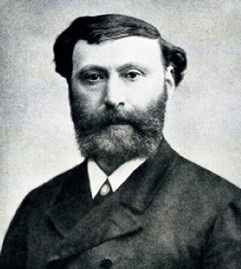

This year is near the centenary of the death of Adam Politzer (1835-1920). Adam Politzer has been described as the Father of Otology and was certainly the most influential person in otology in the latter half of the 19th century.
He is probably best remembered for his eponymous middle ear inflation (Politzerisation) but he worked assiduously in every aspect of otology, developing the value of otoscopy in diagnosing ear disease. He was also at the forefront in the description of many pathological conditions (including his seminal account of otosclerosis). He exploited current progress in pathology and histology to develop new diagnostic and therapeutic procedures. In 1877 he invented a new portable acoumeter to improve on the inadequate contemporary methods of testing auditory acuity.
Politzer was born in Alberti (now Albertirsa), Hungary, but completed his medical studies in Vienna in 1859. He travelled extensively in Europe and worked in Heidelberg, Paris, Würzburg and London. He studied with such great names as Joseph Toynbee and Prosper Meniere, but returned to Vienna.
In 1864, together with von Tröltsch and Schwartze, he founded the Archiv für Ohrenheilkunde, the first periodical to deal exclusively with otology. Later it became the European Archives of Oto-Rhino-Laryngology. With his colleague Gruber, he started the first academic clinic in the world devoted entirely to otology in 1873. This was Politzer’s genius – he was the very first surgeon to embrace otology as an independent specialty in its own right.
His textbook on otology is legendary. There were four first editions (in German 1878, American English 1883, French 1884 and Spanish 1886) and after five various other editions in different languages, eventually a posthumous sixth English edition in 1926.
It is for Politzer’s celebrated book, History of Otology however, that we suggest that he be dubbed the ‘Father of the History of ENT.’ This was not only the first comprehensive textbook on the subject, but it has stood the test of time and still remains unsurpassed as the ‘gold standard’ reference work on the history of otology. It also presents a persuasive and cogent philosophy about the value of studying history of otology. In the Introduction, he warns: “It has become increasingly evident to the physician that in order to gain a thorough understanding of medicine, he must have at least a rudimentary knowledge of its developmental history.” He ends by saying “The history of a scientific specialty should act as a guiding light, connecting the past with the present and establishing the basis for future research.”
Perhaps Søren Kierkegaard, the first existential philosopher, put this same concept very succinctly another way. He said, “Life can only be understood backwards; but it must be lived forwards.”
Having said all this, many otologists remain unconvinced and it is fairly clear that there are two camps with respect to the history of medicine: those who realise its importance and those who consider it a useless triviality. Colleagues who take time to read this feature probably fall into the first group.
more recommended stories
 Texas Medical Board Releases Abortion Training for Physicians
Texas Medical Board Releases Abortion Training for PhysiciansKey Takeaways Texas Medical Board has.
 Safer Allogeneic Stem Cell Transplants with Treg Therapy
Safer Allogeneic Stem Cell Transplants with Treg TherapyA new preclinical study from the.
 Autoimmune Disorders: ADA2 as a Therapeutic Target
Autoimmune Disorders: ADA2 as a Therapeutic TargetAdenosine deaminase 2 (ADA2) has emerged.
 Kaempferol: A Breakthrough in Allergy Management
Kaempferol: A Breakthrough in Allergy ManagementKaempferol, a dietary flavonoid found in.
 Early Milk Cereal Drinks May Spur Infant Weight Gain
Early Milk Cereal Drinks May Spur Infant Weight GainNew research published in Acta Paediatrica.
 TaVNS: A Breakthrough for Chronic Insomnia Treatment
TaVNS: A Breakthrough for Chronic Insomnia TreatmentA recent study conducted by the.
 First-of-Its-Kind Gene-Edited Pig Kidney: Towana’s New Life
First-of-Its-Kind Gene-Edited Pig Kidney: Towana’s New LifeSurgeons at NYU Langone Health have.
 Just-in-Time Training Improves Success & Patient Safety
Just-in-Time Training Improves Success & Patient SafetyA study published in The BMJ.
 ChatGPT Excels in Medical Summaries, Lacks Field-Specific Relevance
ChatGPT Excels in Medical Summaries, Lacks Field-Specific RelevanceIn a recent study published in.
 Study finds automated decision minimizes high-risk medicine combinations in ICU patients
Study finds automated decision minimizes high-risk medicine combinations in ICU patientsA multicenter study coordinated by Amsterdam.

Leave a Comment